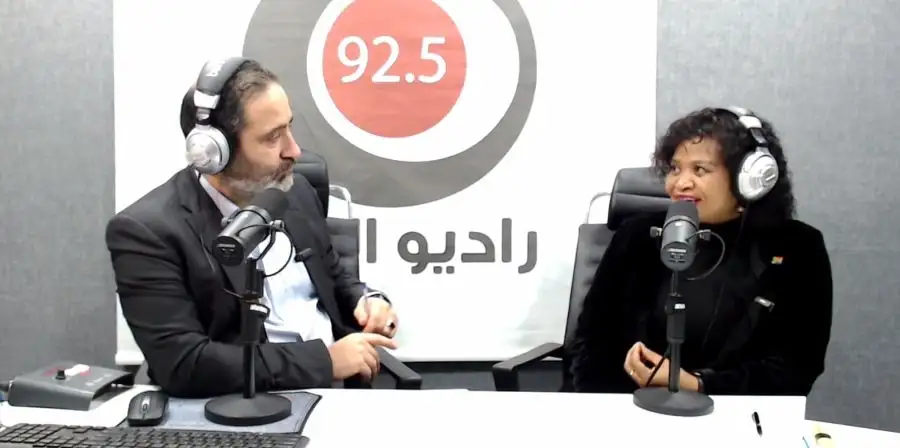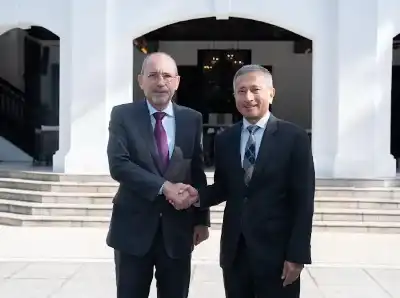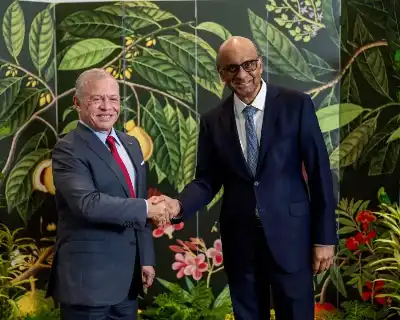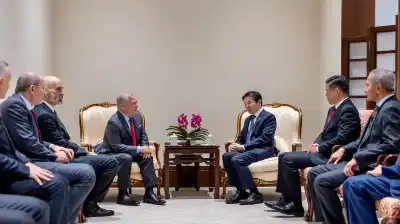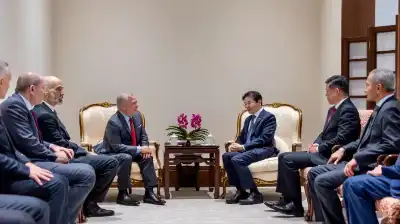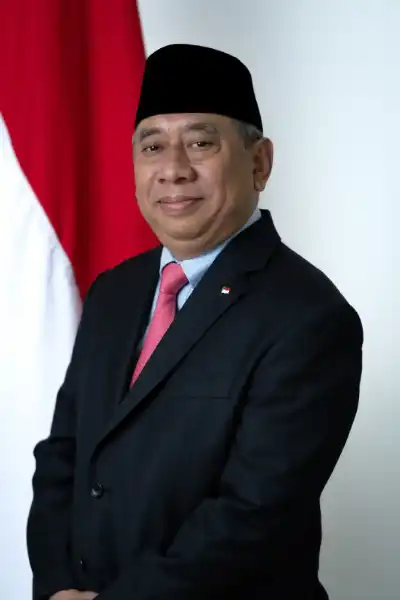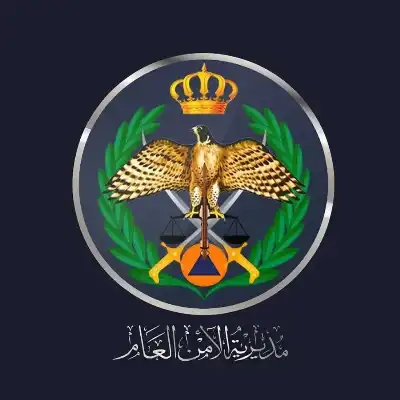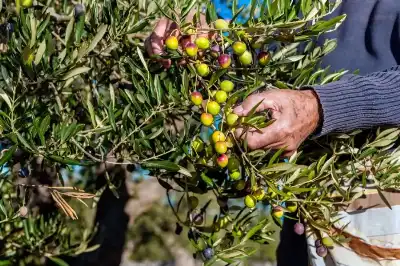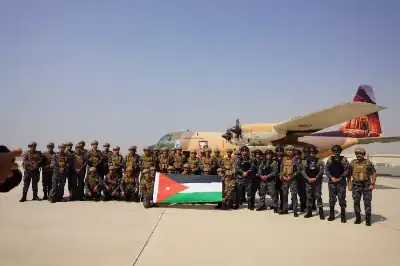مدار الساعة - محمد العرسان - أشادت سفيرة جمهورية جنوب إفريقيا تشيلاني موكوينا بالموقف الأردني الداعم للقضية الفلسطينية، مؤكدة أن الأردن كان في طليعة الدول التي سارعت لتقديم المساعدات خلال العدوان على غزة.
وأثنت السفيرة على الجهود التي بذلها جلالة الملك، مشيرة إلى أنه "لم أرَ أي رئيس دولة يقوم بمثل هذا الدور رأينا الملك بنفسه وهو ينزل المساعدات من الجو، حيث كان الأردن في مقدمة الدول التي أرسلت مساعدات جوية إلى قطاع غزة".
كما أكدت على الدور الإنساني الذي لعبته المستشفيات الميدانية الأردنية في غزة، مشيرة إلى استقبال عدد كبير من الجرحى الفلسطينيين للعلاج في الأردن، ووصفت ذلك بـ"التضحية التي لن تُنسى".
وأشادت السفيرة بوحدة الموقف العربي خلال القمة العربية الأخيرة، حيث أكدت الدول العربية دعمها لحقوق الشعب الفلسطيني ورفض أي محاولات لتهجيره من أرضه، مع التأكيد على ضرورة إعادة إعمار المناطق المتضررة جراء العدوان.
أكدت أن بلادها تعتبر دعم القضية الفلسطينية واجبًا أخلاقيًا مستمدًا من تجربتها التاريخية في مواجهة الفصل العنصري (الأبارتهايد). وأشارت إلى أن التضامن الدولي كان عنصرًا حاسمًا في نضال جنوب إفريقيا ضد التمييز العنصري، مؤكدةً "لا حرية لجنوب إفريقيا ما لم تكن فلسطين حرة".
وأضافت السفيرة خلال مقابلة إذاعية عبر راديو البلد مع الزميل محمد العرسان أن هناك أوجه تشابه كبيرة بين ممارسات الاحتلال الإسرائيلي في فلسطين ونظام الفصل العنصري الذي كان سائدًا في جنوب إفريقيا، مشيرةً إلى أن القيود المفروضة على الفلسطينيين، مثل الحواجز العسكرية والتمييز العرقي والديني، تجعل الوضع الحالي أسوأ من تجربة الأبارتهايد في بلادها.
أكدت الدبلوماسية أن تجربتها في الأردن ساعدتها على فهم أعمق للقضية الفلسطينية، مشيرة إلى أن التشابه بين ما حدث في جنوب أفريقيا خلال حقبة الفصل العنصري وما يعيشه الفلسطينيون اليوم واضح، لكنه أكثر قسوة في فلسطين.
وأشارت إلى أن القيود المفروضة على حركة الفلسطينيين تجعل الحياة اليومية صعبة للغاية، حيث لا يستطيعون التنقل بين القرى دون المرور بنقاط تفتيش إسرائيلية قد تستغرق ساعات، حتى في الحالات الطارئة مثل نقل المرضى إلى المستشفيات.
وأضافت أن القمع الذي تشهده فلسطين اليوم يفوق ما عاشه شعب جنوب أفريقيا، موضحة أنه "رغم كل ما مررنا به، لم يتم تدمير مدننا بالكامل، ولم تُمحَ المساجد والكنائس والمؤسسات الثقافية والمستشفيات كما يحدث الآن في فلسطين".
كما شددت على أن الفلسطينيين الذين يتم تهجيرهم من أراضيهم لا يُسمح لهم بالعودة، على عكس تجربة جنوب أفريقيا، حيث أُعيد الاعتراف بحق العودة في عام 1994، مما سمح للمنفيين بالعودة إلى ديارهم.
وفيما يتعلق بالقضية التي رفعتها جنوب إفريقيا أمام محكمة العدل الدولية ضد إسرائيل بتهمة ارتكاب إبادة جماعية في غزة، شددت السفيرة على أن بلادها لم ترتكب أي مخالفة قانونية، بل استندت إلى التزاماتها الدولية بحقوق الإنسان. وأكدت أن جنوب إفريقيا لن تتراجع عن موقفها رغم الضغوط السياسية والاقتصادية التي تواجهها.
كما تطرقت إلى قانون إصلاح الأراضي في جنوب إفريقيا، نافيةً المزاعم التي تروجها بعض الجهات حول استهداف البيض أو مصادرة الأراضي دون تعويض. وأوضحت أن القانون جاء لمعالجة إرث الفصل العنصري، حيث تم الاستيلاء على الأراضي من الأفارقة دون تعويض تاريخيًا، وأنه بعد 30 عامًا من الديمقراطية لم تتم استعادة سوى 4% من هذه الأراضي.
تقول "وقع رئيس جنوب أفريقيا قانونًا جديدًا للاستيلاء على الأراضي، وهو تشريع مستمد من قانون صدر عام 1975 خلال حقبة الفصل العنصري، حين كانت السلطات تفرض سياسات استيلاء على الأراضي دون تعويض".
"يعود تاريخ هذه القوانين إلى عام 1913، عندما أصدرت حكومة الفصل العنصري قانون الأراضي، الذي سمح بالاستيلاء على مساحات واسعة من الأراضي المملوكة للسكان الأصليين، وحصرهم في مناطق صغيرة تفتقر إلى الحد الأدنى من مقومات الحياة. وفي عام 1936، تم تعديل هذا القانون ليزيد من تضييق الخناق على المجتمعات الأفريقية والملونة، مما أدى إلى تهميش هذه الفئات وحرمانها من حقوق الملكية."
"خلال فترة الفصل العنصري، مُنع الأفارقة والهنود والملونون من امتلاك الأراضي في مساحات واسعة من البلاد، وأُجبروا على العيش في مناطق فقيرة وغير صالحة للزراعة، دون أي تعويضات عن الممتلكات التي تمت مصادرتها."
"واليوم، ومع توقيع هذا القانون الجديد، تثار تساؤلات حول كيفية معالجة إرث هذه السياسات، خاصة أن النظام الديمقراطي الذي أُقيم بعد عام 1994 وعد بإصلاحات عادلة في توزيع الأراضي ".
وختمت على وحدة الموقف الرسمي والشعبي في جنوب افريقيا الداعم لحرية الشعب الفلسطيني "يشهد الشارع الجنوب أفريقي حالة من الانسجام الكبير بين الموقف الرسمي والشعبي فيما يخص دعم القضية الفلسطينية، حيث خرجت مظاهرات متواصلة منذ أشهر تعبيرًا عن التضامن مع الفلسطينيين. هذا الدعم ليس وليد اللحظة، بل يمتد لسنوات طويلة، إذ يرى كثيرون في جنوب أفريقيا تشابهًا بين معاناة الفلسطينيين تحت الاحتلال الإسرائيلي وما عاناه شعبهم خلال حقبة الفصل العنصري (الأبارتهايد)".
…………………………
South Africa’s Ambassador to Jordan: I Have Never Seen Any Head of State Do What King Abdullah II Did (Video)
South Africa’s Ambassador to Jordan: There Is No Freedom for South Africa Unless Palestine Is Free
South Africa’s Ambassador to Jordan, Tselane Mokuena, praised Jordan’s stance in supporting the Palestinian cause, emphasizing that Jordan was at the forefront of countries that rushed to provide aid during the aggression on Gaza.
The ambassador commended King Abdullah II’s efforts, stating, “I have never seen any head of state take such action. We saw the King himself delivering aid from the air, as Jordan was among the leading countries sending airborne assistance to Gaza.”
She also highlighted the humanitarian role of Jordanian field hospitals in Gaza, noting that a large number of injured Palestinians were treated in Jordan. She described this as a “sacrifice that will never be forgotten.”
The ambassador praised the unified stance of Arab countries during the recent Arab Summit, where Arab states reaffirmed their support for Palestinian rights and rejected any attempts to displace the Palestinian people from their land, stressing the need for reconstruction in the affected areas.
She emphasized that her country considers support for the Palestinian cause a moral duty rooted in South Africa’s historical struggle against apartheid. She noted that international solidarity was a crucial element in South Africa’s fight against racial discrimination, affirming: “There is no freedom for South Africa unless Palestine is free.”
In a radio interview on Radio Al-Balad with journalist Mohammad Al-Ersan, the ambassador pointed out the striking similarities between Israeli occupation practices in Palestine and the apartheid system that once existed in South Africa. She explained that restrictions imposed on Palestinians, such as military checkpoints, racial and religious discrimination, make the current situation even worse than apartheid.
The diplomat stated that her experience in Jordan had deepened her understanding of the Palestinian issue, noting that the resemblance between what happened in South Africa during apartheid and what Palestinians face today is evident, but even harsher in Palestine.
She pointed out that movement restrictions imposed on Palestinians make daily life extremely difficult, as they cannot travel between villages without passing through Israeli checkpoints, where they may have to wait for hours—even in emergencies such as seeking medical treatment.
She added that the repression witnessed in Palestine today surpasses what the people of South Africa endured, explaining, “Despite everything we went through, our cities were never completely destroyed, and mosques, churches, cultural institutions, and hospitals were not erased as they are in Palestine today.”
She also emphasized that Palestinians who are displaced from their land are not allowed to return, unlike South Africa’s experience, where the right of return was recognized in 1994, allowing exiled citizens to return to their homes.
South Africa’s Legal Battle Against Israel
Regarding the case South Africa filed against Israel at the International Court of Justice (ICJ) for committing genocide in Gaza, the ambassador stressed that her country had acted fully within legal boundaries, citing its international human rights commitments. She affirmed that South Africa would not back down despite facing political and economic pressure.
She also addressed South Africa’s land reform law, rejecting claims that it targets white citizens or seizes land without compensation. She clarified that the law aims to rectify the legacy of apartheid, where land was historically confiscated from Africans without compensation. She noted that after 30 years of democracy, only 4% of this land has been reclaimed.
She explained, “The President of South Africa has signed a new land expropriation law, derived from legislation enacted in 1975 during the apartheid era, when authorities implemented policies of land confiscation without compensation.”
"These laws date back to 1913 when the apartheid government issued the Land Act, allowing the seizure of vast areas owned by indigenous communities and restricting them to small, resource-poor lands. In 1936, this law was amended to further tighten control over African and colored communities, leading to their marginalization and denial of property rights."
"During apartheid, Africans, Indians, and colored people were prohibited from owning land in vast parts of the country and were forced to live in impoverished, agriculturally unviable areas, without any compensation for their confiscated properties."
"Today, with the signing of this new law, questions arise about how to address the legacy of these policies, especially since the democratic system established after 1994 promised fair land distribution reforms.”
Unified Popular and Official Stance in South Africa on Palestine
The ambassador concluded by highlighting the strong alignment between the South African government and its people in supporting Palestinian freedom. She stated:
"The South African public overwhelmingly supports the Palestinian cause, as evidenced by the continuous protests for months. This support is not a recent development but has existed for years. Many in South Africa see a strong parallel between the suffering of Palestinians under Israeli occupation and their own struggle against apartheid.”
